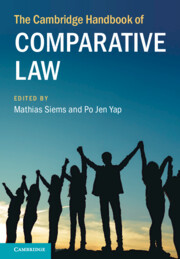Book contents
- The Cambridge Handbook of Comparative Law
- The Cambridge Handbook of Comparative Law
- Copyright page
- Contents
- Figures
- Tables
- Contributors
- Preface
- Abbreviations
- 1 Introduction
- Part I Methods of Comparative Law
- Part II Legal Families and Geographical Comparisons
- Part III Central Themes in Comparative Law
- 19 The Tradition of Comparative Law: Comparison and Its Colonial Legacies
- 20 Decolonial Theory and Comparative Law
- 21 Legal Transplants: A Theoretical Framework and a Case Study from Public Law
- 22 Legal Transplants: A Case Study of Private Law in Its Historical Context
- 23 Convergence and Divergence in Public Law
- 24 Convergence and Divergence in Company Law
- 25 Law and Development
- 26 Divided Legal Systems
- 27 Legal Pluralism and Commerce
- Part IV Comparative Law beyond the State
- Index
20 - Decolonial Theory and Comparative Law
from Part III - Central Themes in Comparative Law
Published online by Cambridge University Press: 26 January 2024
- The Cambridge Handbook of Comparative Law
- The Cambridge Handbook of Comparative Law
- Copyright page
- Contents
- Figures
- Tables
- Contributors
- Preface
- Abbreviations
- 1 Introduction
- Part I Methods of Comparative Law
- Part II Legal Families and Geographical Comparisons
- Part III Central Themes in Comparative Law
- 19 The Tradition of Comparative Law: Comparison and Its Colonial Legacies
- 20 Decolonial Theory and Comparative Law
- 21 Legal Transplants: A Theoretical Framework and a Case Study from Public Law
- 22 Legal Transplants: A Case Study of Private Law in Its Historical Context
- 23 Convergence and Divergence in Public Law
- 24 Convergence and Divergence in Company Law
- 25 Law and Development
- 26 Divided Legal Systems
- 27 Legal Pluralism and Commerce
- Part IV Comparative Law beyond the State
- Index
Summary
The colonial question has not been sufficiently addressed by comparative legal studies. Although more scholars acknowledge the Eurocentric bias of the discipline, a radical rethinking of its methods and assumptions has not emerged yet. To contribute to decolonising comparative law, this chapter proposes two strategies. First, engaging with indigenous or Southern scholars that think from a decolonial episteme. These scholars often address comparative issues from their own experience of past colonialism and present coloniality. Second, engaging with social actors on the ground through decolonial methodologies. Engaging with the political agendas of local and indigenous peoples and activists allows a deep understanding of their concerns and aspirations. To explain the implications of these strategies, the chapter discusses the issue of norm diffusion in human rights debates. Viewed through a decolonial lens, this would suggest that indigenous and local people are norm makers rather than being mere norm takers or beneficiaries. Then, they either reinterpret the norms or produce their own norms. Some of these norms are local and global at the same time. They are embedded in their own local thinking and practice, but also are emerging as valuable legal models to address global social and ecological crises.
Keywords
- Type
- Chapter
- Information
- The Cambridge Handbook of Comparative Law , pp. 408 - 425Publisher: Cambridge University PressPrint publication year: 2024

